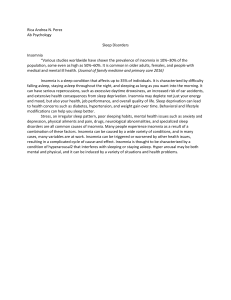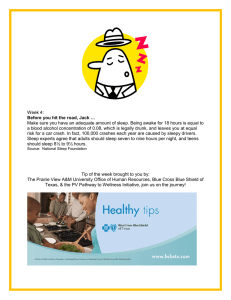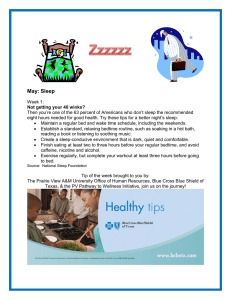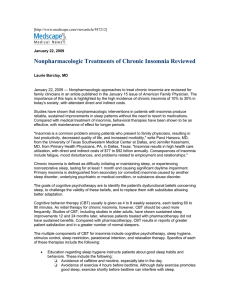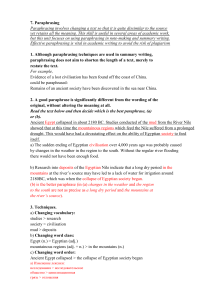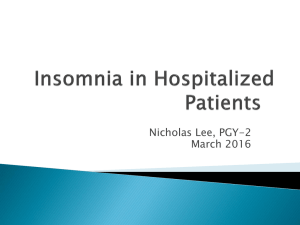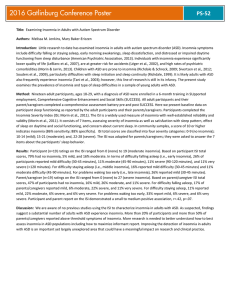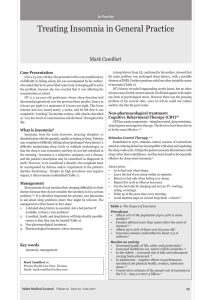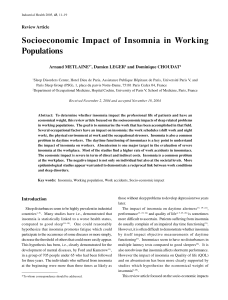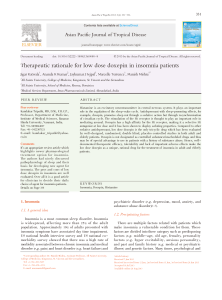Document 12791820
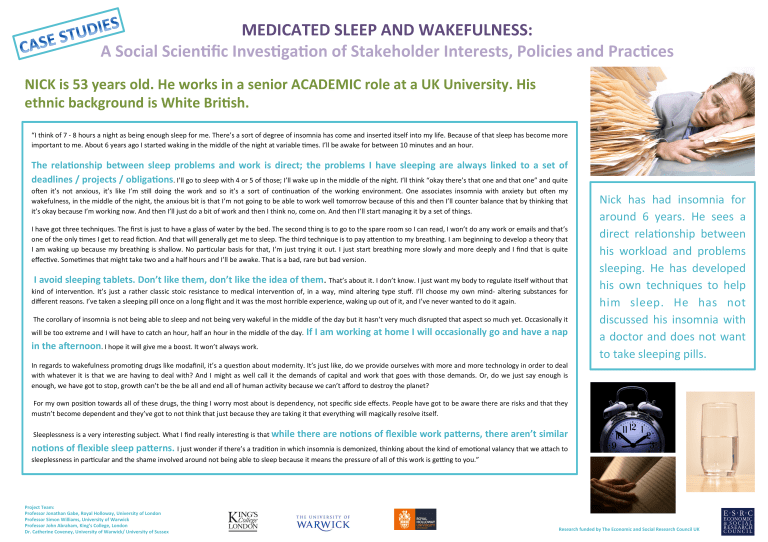
MEDICATED SLEEP AND WAKEFULNESS:
A Social Scien9fic Inves9ga9on of Stakeholder Interests, Policies and Prac9ces
NICK is 53 years old. He works in a senior ACADEMIC role at a UK University. His ethnic background is White Bri9sh.
“I think of 7 -‐ 8 hours a night as being enough sleep for me. There’s a sort of degree of insomnia has come and inserted itself into my life. Because of that sleep has become more important to me. About 6 years ago I started waking in the middle of the night at variable Cmes. I’ll be awake for between 10 minutes and an hour.
The rela9onship between sleep problems and work is direct; the problems I have sleeping are always linked to a set of deadlines / projects / obliga9ons
. I’ll go to sleep with 4 or 5 of those; I’ll wake up in the middle of the night. I’ll think “okay there’s that one and that one” and quite oKen it’s not anxious, it’s like I’m sCll doing the work and so it’s a sort of conCnuaCon of the working environment. One associates insomnia with anxiety but oKen my wakefulness, in the middle of the night, the anxious bit is that I’m not going to be able to work well tomorrow because of this and then I’ll counter balance that by thinking that it’s okay because I’m working now. And then I’ll just do a bit of work and then I think no, come on. And then I’ll start managing it by a set of things.
I have got three techniques. The first is just to have a glass of water by the bed. The second thing is to go to the spare room so I can read, I won’t do any work or emails and that’s one of the only Cmes I get to read ficCon. And that will generally get me to sleep. The third technique is to pay aQenCon to my breathing. I am beginning to develop a theory that
I am waking up because my breathing is shallow. No parCcular basis for that, I’m just trying it out. I just start breathing more slowly and more deeply and I find that is quite effecCve. SomeCmes that might take two and a half hours and I’ll be awake. That is a bad, rare but bad version.
I avoid sleeping tablets. Don’t like them, don’t like the idea of them .
That’s about it. I don’t know. I just want my body to regulate itself without that kind of intervenCon. It’s just a rather classic stoic resistance to medical intervenCon of, in a way, mind altering type stuff. I’ll choose my own mind-‐ altering substances for different reasons. I’ve taken a sleeping pill once on a long flight and it was the most horrible experience, waking up out of it, and I’ve never wanted to do it again.
The corollary of insomnia is not being able to sleep and not being very wakeful in the middle of the day but it hasn’t very much disrupted that aspect so much yet. Occasionally it will be too extreme and I will have to catch an hour, half an hour in the middle of the day.
If I am working at home I will occasionally go and have a nap in the aOernoon
. I hope it will give me a boost. It won’t always work.
In regards to wakefulness promoCng drugs like modafinil, it’s a quesCon about modernity. It’s just like, do we provide ourselves with more and more technology in order to deal with whatever it is that we are having to deal with? And I might as well call it the demands of capital and work that goes with those demands. Or, do we just say enough is enough, we have got to stop, growth can’t be the be all and end all of human acCvity because we can’t afford to destroy the planet?
For my own posiCon towards all of these drugs, the thing I worry most about is dependency, not specific side effects. People have got to be aware there are risks and that they mustn’t become dependent and they’ve got to not think that just because they are taking it that everything will magically resolve itself.
Sleeplessness is a very interesCng subject. What I find really interesCng is that while there are no9ons of flexible work paRerns, there aren’t similar no9ons of flexible sleep paRerns.
I just wonder if there’s a tradiCon in which insomnia is demonized, thinking about the kind of emoConal valancy that we aQach to sleeplessness in parCcular and the shame involved around not being able to sleep because it means the pressure of all of this work is ge[ng to you.”
Nick has had insomnia for around 6 years. He sees a direct relaConship between his workload and problems sleeping. He has developed his own techniques to help him sleep. He has not discussed his insomnia with a doctor and does not want to take sleeping pills.
Project Team:
Professor Jonathan Gabe, Royal Holloway, University of London
Professor Simon Williams, University of Warwick
Professor John Abraham, King’s College, London
Dr. Catherine Coveney, University of Warwick/ University of Sussex
Research funded by The Economic and Social Research Council UK
